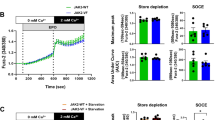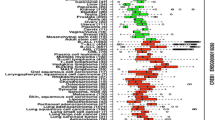Abstract
Transcription factor CCAAT/enhancer-binding protein-alpha (C/EBPα) regulates myelopoiesis by coupling growth arrest with differentiation of myeloid progenitors. Mutations in one or both alleles are observed in 10–14% AML cases that render C/EBPα functionally inactive. Besides, antagonistic protein–protein interactions also impair C/EBPα expression and function. In recent independent studies, we showed that CDK2 and SKP2 downregulated C/EBPα expression in an ubiquitin-dependent proteasome degradation manner leading to differentiation block in AML. Here, we demonstrate that CDK2-instigated C/EBPα downregulation is actually mediated by SKP2. Mechanistically, we show that CDK2 stabilizes SKP2 by phosphorylating it at Ser64 and thereby potentiates C/EBPα ubiquitination and subsequent degradation in AML cells. Immunoblot experiments showed that CDK2 inhibition downregulated SKP2 levels and concomitantly enhanced C/EBPα levels in myeloid cells. We further show that while CDK2 promoted C/EBPα ubiquitination and inhibited its protein levels, negatively affected its transactivation potential and DNA binding ability, simultaneous SKP2 depletion abrogated CDK2-promoted ubiquitination and restored C/EBPα expression and function. Taken together, these findings consolidate that CDK2 potentiates SKP2-mediated C/EBPα degradation in AML and targeting CDK2-SKP2 axis can be harnessed for therapeutic benefit in AML.
Graphic abstract
Hypothetical model depicts that SKP2-mediated C/EBPα proteasomal degradation is reinforced by CDK2. CDK2 phopshorylates SKP2 leading to its enhanced stabilization which in turn exaggerates C/EBPα degradation leading to differentiation arrest in AML.






Similar content being viewed by others
Data availability
All the materials, data and associated protocols of this study shall be made available to bona fide researcher or reader requests without undue delay or qualifications.
References
Keeshan K, Santilli G, Corradini F, Perrotti D, Calabretta B. Transcription activation function of C/EBPalpha is required for induction of granulocytic differentiation. Blood. 2003;102:1267–75.
Min YM, Zhang H, Giovanni AG, Henry YH, Staber PB, Zhang P, Levantini E, Alberich-Jordà M, Zhang J, Kawasaki A, Tenen DG. C/EBPa controls acquisition and maintenance of adult hematopoietic stem cell quiescence. Nat Cell Biol. 2013;15:385–94.
Pal P, Lochab S, Kanaujiya JK, Kapoor I, Sanyal S, Behre G, Trivedi AK. E6AP, an E3 ubiquitin ligase negatively regulates granulopoiesis by targeting transcription factor C/EBPalpha for ubiquitin-mediated proteasome degradation. Cell Death Dis. 2013;4:e590.
Avellino R, Delwel R. Expression and regulation of C/EBPalpha in normal myelopoiesis and in malignant transformation. Blood. 2017;129:2083–91.
Pulikkan JA, Tenen DG, Behre G. C/EBPalpha deregulation as a paradigm for leukemogenesis. Leukemia. 2017;31:2279–85.
Porse BT, Pedersen TA, Xu X, Lindberg B, Wewer UM, Friis-Hansen L, Nerlov C. E2F repression by C/EBPalpha is required for adipogenesis and granulopoiesis in vivo. Cell. 2001;107:247–58.
Pabst T, Mueller BU. Transcriptional dysregulation during myeloid transformation in AML. Oncogene. 2007;26:6829–37.
Trivedi AK, Pal P, Behre G, Singh SM. Multiple ways of C/EBPalpha inhibition in myeloid leukaemia. Eur J Cancer. 2008;44:1516–23.
Pabst T, Mueller BU, Harakawa N, Schoch C, Haferlach T, Behre G, Hiddemann W, Zhang DE, Tenen DG. AML1-ETO downregulates the granulocytic differentiation factor C/EBPalpha in t(8;21) myeloid leukemia. Nat Med. 2001;7:444–51.
Pabst T, Mueller BU, Zhang P, Radomska HS, Narravula S, Schnittger S, Behre G, Hiddemann W, Tenen DG. Dominant-negative mutations of CEBPA, encoding CCAAT/enhancer binding protein-alpha (C/EBPalpha), in acute myeloid leukemia. Nat Genet. 2001;27:263–70.
Tenen DG. Disruption of differentiation in human cancer: AML shows the way. Nat Rev Cancer. 2003;3:89–101.
Geletu M, Balkhi MY, Peer Zada AA, Christopeit M, Pulikkan JA, Trivedi AK, Tenen DG, Behre G. Target proteins of C/EBPalphap30 in AML: C/EBPalphap30 enhances sumoylation of C/EBPalphap42 via up-regulation of Ubc9. Blood. 2007;110:3301–9.
Bararia D, Kwok HS, Welner RS, Numata A, Sarosi MB, Yang H, Wee S, Tschuri S, Ray D, Weigert O, Levantini E, Ebralidze AK, Gunaratne J, Tenen DG. Acetylation of C/EBPalpha inhibits its granulopoietic function. Nat Commun. 2016;7:10968.
Bararia D, Trivedi AK, Zada AA, Greif PA, Mulaw MA, Christopeit M, Hiddemann W, Bohlander SK, Behre G. Proteomic identification of the MYST domain histone acetyltransferase TIP60 (HTATIP) as a co-activator of the myeloid transcription factor C/EBPalpha. Leukemia. 2008;22:800–7.
Bengoechea-Alonso MT, Ericsson J. The ubiquitin ligase Fbxw7 controls adipocyte differentiation by targeting C/EBPalpha for degradation. Proc Natl Acad Sci USA. 2010;107:11817–22.
Keeshan K, He Y, Wouters BJ, Shestova O, Xu L, Sai H, Rodriguez CG, Maillard I, Tobias JW, Valk P, Carroll M, Aster JC, Delwel R, Pear WS. Tribbles homolog 2 inactivates C/EBPalpha and causes acute myelogenous leukemia. Cancer Cell. 2006;10:401–11.
Thacker G, Mishra M, Sharma A, Singh AK, Sanyal S, Trivedi AK. CDK2 destabilizes tumor suppressor C/EBPα expression through ubiquitin-mediated proteasome degradation in acute myeloid leukemia. J Cell Biochem. 2020;121:2839–50.
Thacker G, Mishra M, Sharma A, Singh AK, Sanyal S, Trivedi AK. E3 ligase SCFSKP2 ubiquitinates and degrades tumor suppressor C/EBPα in acute myeloid leukemia. Life Sci. 2020. https://doi.org/10.1016/j.lfs.2020.118041.
D’Alo F, Johansen LM, Nelson EA, Radomska HS, Evans EK, Zhang P, Nerlov C, Tenen DG. The amino terminal and E2F interaction domains are critical for C/EBP alpha-mediated induction of granulopoietic development of hematopoietic cells. Blood. 2003;102:3163–71.
Porse BT, Bryder D, Theilgaard-Monch K, Hasemann MS, Anderson K, Damgaard I, Jacobsen SE, Nerlov C. Loss of C/EBP alpha cell cycle control increases myeloid progenitor proliferation and transforms the neutrophil granulocyte lineage. J Exp Med. 2005;202:85–96.
Rubin SM. Deciphering the retinoblastoma protein phosphorylation code. Trends Biochem Sci. 2013;38:12–9.
Lin Y, Li D, Liang Q, Liu S, Zuo X, Li L, Sun X, Li W, Guo M, Huang Z. miR-638 regulates differentiation and proliferation in leukemic cells by targeting cyclin-dependent kinase 2. J Biol Chem. 2015;290:1818–28.
Radosevic N, Delmer A, Tang R, Marie JP, Ajchenbaum-Cymbalista F. Cell cycle regulatory protein expression in fresh acute myeloid leukemia cells and after drug exposure. Leukemia. 2001;15:559–66.
Ying M, Shao X, Jing H, Liu Y, Qi X, Cao J, Chen Y, Xiang S, Song H, Hu R, Wei G, Yang B, He Q. Ubiquitin-dependent degradation of CDK2 drives the therapeutic differentiation of AML by targeting PRDX2. Blood. 2018;131:2698–711.
Trivedi AK, Bararia D, Christopeit M, Peerzada AA, Singh SM, Kieser A, Hiddemann W, Behre HM, Behre G. Proteomic identification of C/EBP-DBD multiprotein complex: JNK1 activates stem cell regulator C/EBPalpha by inhibiting its ubiquitination. Oncogene. 2007;26:1789–801.
Rodier G, Coulombe P, Tanguay PL, Boutonnet C, Meloche S. Phosphorylation of Skp2 regulated by CDK2 and Cdc14B protects it from degradation by APC(Cdh1) in G1 phase. EMBO J. 2008;27:679–91.
Lochab S, Pal P, Kanaujiya JK, Tripathi SB, Kapoor I, Bhatt ML, Sanyal S, Behre G, Trivedi AK. Proteomic identification of E6AP as a molecular target of tamoxifen in MCF7 cells. Proteomics. 2012;12:1363–77.
Carrano AC, Eytan E, Hershko A, Pagano M. SKP2 is required for ubiquitin-mediated degradation of the CDK inhibitor p27. Nat Cell Biol. 1999;1:193–9.
Kim SY, Herbst A, Tworkowski KA, Salghetti SE, Tansey WP. Skp2 regulates Myc protein stability and activity. Mol Cell. 2003;11:1177–88.
Shao X, Xiang S, Fu H, Chen Y, Xu A, Liu Y, Qi X, Cao J, Zhu H, Yang B, He Q, Ying M. CDK2 suppression synergizes with all-trans-retinoic acid to overcome the myeloid differentiation blockade of AML cells. Pharmacol Res. 2020;151:104545.
Rashid A, Duan X, Gao F, Yang M, Yen A. Roscovitine enhances All-trans retinoic acid (ATRA)-induced leukemia cell differentiation: novel effects on signaling molecules for a putative Cdk2 inhibitor. Cell Signal. 2020;71:109555.
Acknowledgements
Authors also acknowledge technical support provided by Dr. A. L. Vishwakarma (FACS Unit) of Sophisticated and Analytical Instrument Facility of CSIR-CDRI. CDRI communication number for this article is 10247.
Funding
Grant-in-aid (GAP0239) from Lady Tata Memorial Trust (LTMT), Mumbai to Arun Kumar Trivedi and fellowship to Gatha Thacker from Indian Council of Medical Research (ICMR), New Delhi is acknowledged.
Author information
Authors and Affiliations
Contributions
Study design: AKT; Study conduct: GT, MM, AS, AKS; Data analysis: AKT, GT, AS; Data interpretation: AKT, GT, MM, SS; Drafting manuscript: GT, AKT. Approving final version of manuscript: AKT, GT.
Corresponding author
Ethics declarations
Conflict of interest
The authors declare that they have no conflict of interest.
Additional information
Publisher's Note
Springer Nature remains neutral with regard to jurisdictional claims in published maps and institutional affiliations.
Rights and permissions
About this article
Cite this article
Thacker, G., Mishra, M., Sharma, A. et al. CDK2-instigates C/EBPα degradation through SKP2 in Acute myeloid leukemia. Med Oncol 38, 69 (2021). https://doi.org/10.1007/s12032-021-01523-9
Received:
Accepted:
Published:
DOI: https://doi.org/10.1007/s12032-021-01523-9




